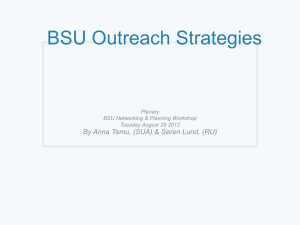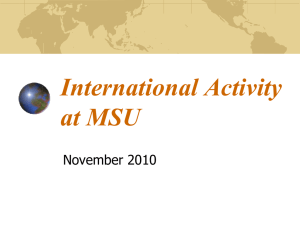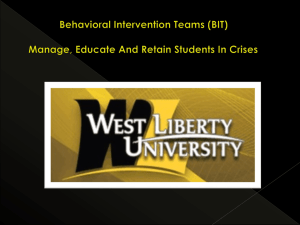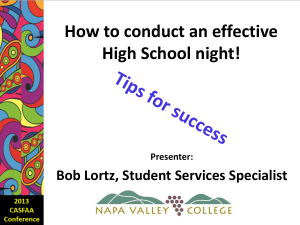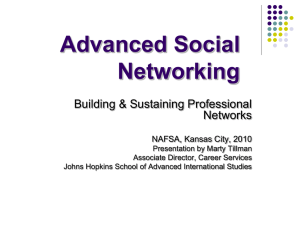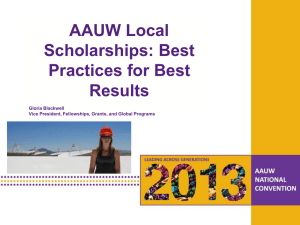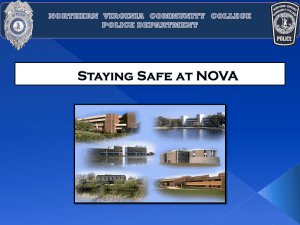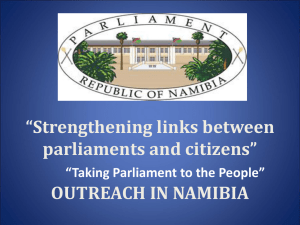Slide 1 - IACLEA
advertisement
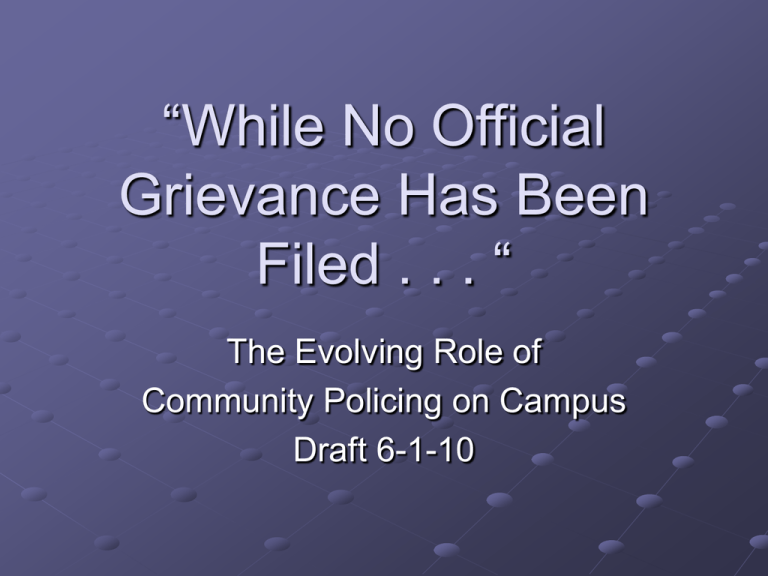
“While No Official Grievance Has Been Filed . . . “ The Evolving Role of Community Policing on Campus Draft 6-1-10 Elizabeth Cahn Planning and Community Outreach Coordinator, 2007-2010 Mount Holyoke College Hampshire College Smith College 2007+ 2008+ 2009+ Goals of Presentation Community policing Definitions History Challenges Case studies Outreach, complaints, profiling Important lessons Community Policing Definitions History Community Policing Challenges Time, scheduling, and definitions of productivity Not all staff are equally skilled or interested Campus community norms and values around police and authority vary enormously Increased officer visibility may increase negative responses Community Policing Case Studies Michigan State University, 1999 Harvard University, 2003 Mount Holyoke College Hampshire College Smith College Mount Holyoke model Three elite undergraduate liberal arts colleges in western Massachusetts Traditional college age populations Millenial generation characteristics Increasingly diverse campus communities Gender and gender identities Race, ethnicity, nationality Sexual orientation Intellectual and activist identities Mount Holyoke model Civilian outreach model – 1.0 FTE Four approximately equal parts - Intradepartment work Easy, obvious outreach Extremely difficult outreach What the community brings forward Civilian Outreach Intradepartmental work Advise Director/Chief and Senior Command Understand department functioning, strengths, and challenges Know the staff and their concerns Know policies and procedures that affect campus most strongly Assist in identifying and developing trainings and outreach opportunities for others Civilian Outreach Easy, obvious outreach Work on sexual assault and domestic violence issues with other on-campus and off-campus groups Work with student groups that are open to collaboration with public safety/police Work with staff/faculty individuals and groups on campus safety Create collaborative groups where possible Civilian Outreach Extremely difficult outreach Connect to groups that typically distrust police/public safety Students of color, international and LGBT students Faculty Activists, anarchists Connect to individuals who have reason to distrust police/public safety Some will be part of organized groups, some not Civilian Outreach Extremely difficult outreach Systematic desensitization of the campus community to public safety/police Enter spaces, places, meetings, events where a uniformed officer or high level public safety staff member will cause alarm Connect to marginalized groups in a low-key way Introduce profiling as a topic of concern to department as well as campus Civilian Outreach What the community brings forward Issues include Presence of police/security on campus Power and authority (including weapons) Specific responses Profiling and hate crimes Triangulation of public safety/police into other campus issues and concerns Civilian Outreach Disadvantages of civilian outreach Finding the right person Not fully identified with department Has to earn trust of members of department Trust will never be complete Can be difficult to allow “outsider” access to Training Policy Discipline Civilian Outreach Advantages Not fully identified with department No uniform, no enforcement role or responsibilities More able to gain trust of community members Can represent department to the community in useful ways Can engage community in self-critique around issues of authority and enforcement Civilian Outreach Qualities of civilian outreach personnel Excellent social skills Excellent communication skills Know something about public safety Know your institution Able to be in uncomfortable situations with people they don’t know Able to tolerate incommensurable views of the world simultaneously Special Projects MHACASA Collaboration, Mount Holyoke College, 2008-2009 Mount Holyoke College African and Caribbean Student Association participated in a year-long collaboration with DPS, including reciprocal social events, adoption of staff by students, and participation in public projects. Student leadership helped minimize student reaction to allegations of profiling Special Projects Parking ticket study, Mount Holyoke College, 2008-2009 Member of the riding team analyzed two years of parking data for a class project Research found that members of the riding team with cars on campus earn parking tickets at 2.5 times the rate of other MHC students with cars. Special Projects Multicultural Community and Campus Life Committee (MCCL), Mount Holyoke College, 2009-2010 Represented Department of Public Safety on campus-wide committee to address campus climate on diversity Represented a different side of Public Safety to committee membership Developed relationships with campus leaders on diversity Special Projects Transgender Policy and Training, Hampshire College, 2009-2010 Participated in public meeting about arrests Engaged in long-term behind-the-scenes work with staff inside and outside department Worked with student committee to create open forums about student rights Met with individual students at Hampshire and Mount Holyoke for remainder of academic year Special Projects Community Relations Training, 2010 Developed training on community relations using the Henry Louis Gates, Jr. arrest by Sergeant James Crowley as a case study Utilized Intergroup Dialogue methods Two department staff are already trained as facilitators Additional staff are being trained this year Special Projects Five College Public Safety Community Outreach group Initiated cross-campus discussions about public safety and policing Included public safety, police, deans, student life and multicultural affairs staff, and ombuds offices Outreach to SGA leaders, student activities staff, local police departments, mental health counselors Special Projects Ideas I want to try Community dialogue projects using Intergroup Dialogue methods with students, staff, faculty Programming with ombuds staff on outreach, training, and response to incidents and allegations Watch crime/legal TV shows with Dean of the College and Senior Detective Complaints Every complaint is an opportunity Respond formally and informally Assess your campus issues Voice the unspoken concerns Work ahead of the complaints Build a track record of responding Publicize it every year Engage and follow up Profiling Be realistic about campus beliefs Race-based values/experiences Class-based values/experiences Intellectual biases against police/authority Activist biases against police/authority Role of projection and fear Personal, family, subculture, culture Media and social media Profiling Every bad cop anywhere who profiles reflects poorly on your department Initiate topic and discussion of profiling Definitions of profiling vary by standpoint Educate about your policy and training Complaints Educate about how to file formal complaints Respond quickly to informal complaints Complaints may increase, at least for a time Profiling Analytic frames are not equal The people who feel safe don’t need to complain, and the people who don’t feel safe don’t feel safe enough to complain Stay in the dialogue and follow up Increased transparency and accountability go both ways Hold your department and the campus community to a higher standard Principles of Outreach Do it or don’t do it Run your department well Be sincere, not perfect Keep an educational focus Build relationships for the long term Reach out to key people, not everyone Look for strategic opportunities Principles of Outreach Show up in unexpected places and at unexpected times Be respectful of community boundaries If you can’t work directly, work indirectly Connect to those who can translate Plant seeds, water them, and wait It’s not always who you know, but who knows you Thank you! Please send comments to ecahn@mtholyoke.edu or ecahn@larp.umass.edu
